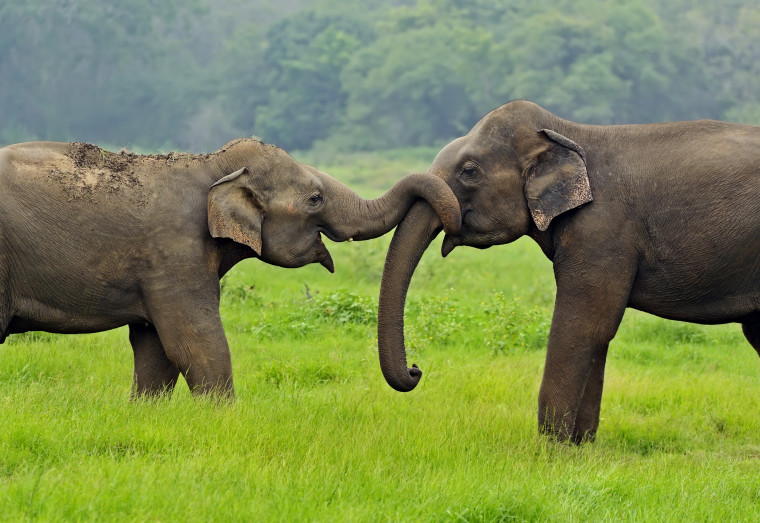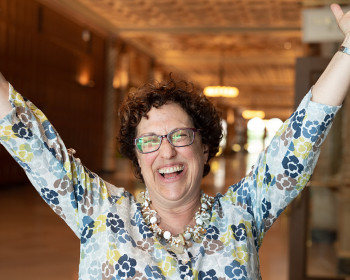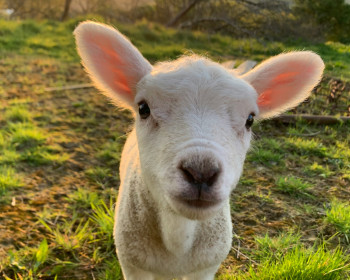Center for Animal Law Studies Grads Boost Focus on Animal Law in Asia
Open gallery

Joyce Tischler—who is affectionately called “the Mother of Animal Law”—has developed first-hand experience, over her forty-one year career, with pushing the law to recognize the interests of animals. As a Professor of Practice and a member of our team at the Center for Animal Law Studies, Joyce’s legacy now is teaching the next generation of animal law attorneys. And she is one of their biggest fans, rooting for them as they go out on their own to facilitate the growth of animal law in their home countries, reminiscent of her early career.
Recently, Joyce sat down with two of her former students—Animal Law LLM alumni, Lyudmilla Shegay, our first student from Kazakhstan, and Zihao Yu, one of our first students from China—to discuss how they are expanding animal law in Asia. Lu and Zihao received their Animal Law LLM in 2020, and have recently founded a nonprofit animal protection organization called Institute of Animal Law of Asia.
Enjoy this conversation as Lu and Zihao discuss with Joyce their aspirations to pave the way for the growth of animal law in Asia and how CALS helped them on their path.
Joyce: I was so thrilled to hear your exciting news about founding the Institute of Animal Law of Asia! It is something to be very proud of. Let’s start with the basics. When you talk about Asia, which countries are you referring to?
Lu and Zihao: Thank you so much for your kind words, Joyce! When we speak about Asia, we are referring to all Asian countries and regions, but we are focusing first on countries with materials we can get access to in English, Chinese, and Russian languages. We refer to the countries that are geographically located in Asia but exclude some countries that are usually regarded as European countries, e.g, Azerbaijan, Armenia, Turkey. We may sometimes address animal issues of Russia in our work due to its significant influence on certain Asian countries and because a big part of Russia is located in Asia.
Joyce: Can you share a little about the status of animal law in Asia?
Lu and Zihao: Because the two of us are from Asia, we have witnessed first-hand the level of the legal protection of animals in our home countries, and we came to the conclusion that one of the underlying problems is the lack of awareness. At the present time, one of our big projects is “Legal Research on Animal Law in Asian Countries”. We’ve already covered 23 countries and will provide further analysis soon. In most Asian countries, there is legislation on wild animal conservation and farmed animal regulation, as well as anti-cruelty law and animal welfare law in some of the countries. Certain countries also offer legal protections for animals used in entertainment and scientific research. In general, however, the level of protection needs to be improved, according to the Animal Protection Index of World Animal Protection, which “ranks countries on their commitment to protect animals in their legislation, improve animal welfare and recognize animal sentience.” The rankings go from A (highest) to G (lowest). All listed Asian countries are ranked from C to G.
Joyce: What are the most pressing animal protection issues in each of your home countries? Lu, let’s start with you.
Lu: Currently, one of the main problems in Kazakhstan is animal abuse. I keep seeing such brutal treatment of domestic animals by people from the young generation and even the recent cruel beating of a unique mammal for Kazakhstan—a Caspian seal. Many videos of animal cruelty are published on the Internet, and as a result, more and more individuals are demanding justice for animals through prosecuting people who commit animal abuse. Recently, a lot of animal rights efforts have been initiated that support the protection of animals through the law.
There is no unifying legal instrument aimed at the protection of animals in any of the Central Asian countries, but Kazakhstan is developing an Animal Welfare Act (AWA). I participated in the discussion with the Ministry of Ecology, Geology, and Natural Resources and contributed to the draft law, and I hope the Act will become law soon. With the forthcoming AWA, the protection of certain categories of animals will be regulated.
Joyce: Zihao, I have the same question for you. I’m so grateful to have been able to travel and speak in China in 2019 at the 11th Asia for Animals Symposium and to meet with so many wonderful people who are working for animal protection. What do you want to share about which animals need our help in China?
Zihao: The wildlife trade is experiencing a big change because of the pandemic. The Wildlife Animal Protection Law has been revised with regulations to ban the artificial breeding of wild animals for food. People are being educated that eating wild animals is bad and not safe for public health and society. The next step is finding alternatives to the use of animals in Traditional Chinese Medicine (TCM). Pangolin scales are used in TCM, and these scales continue to remain a listed ingredient in eight TCMs according to earlier reports. And, keeping artificially bred wildlife animals as pets is neither regulated nor is the public paying attention to it as of yet.
The anti-cruelty issue is heated in China. Increasingly, public attention is drawn to videos or photos on the Internet that show cruelty done to animals. China does not yet have an anti-cruelty law, so there is a lot of discussion on whether these improper acts of cruelty are legal or illegal, but a law would answer those questions.
Almost all the activists and organizations I know in China are eager for the passage of a general Animal Protection Law, which would cover the protection and welfare of domestic animals. Although some scholars have said that mainland China is not yet ready for animal welfare law, I don’t agree with that because other jurisdictions in China already have general laws for animal welfare and anti-cruelty. The main obstacle to the passage of an Animal Protection Law is that animal cruelty is not widely known to the general public yet. In my opinion, activists must work to educate the public and increase public awareness and attention to animals before they can achieve animal protection laws and enforcement.
More and more Chinese people have pets, which is great, but the overpopulation of stray cats and dogs is a problem. As there is no law banning the sale of pets, no law setting limitations for the breeders, and no punishment for abandoning animals, the amount of stray cats and dogs exceeds the capacity of all Chinese shelters and adoption centers. Again, that demonstrates the necessity to educate the public and draw the government’s attention to this issue. Aquatic animals and farmed animals need legal protections, but their welfare receives little attention from the public and the government.
Joyce: What are the key issues that you are currently working on for animals and how do you hope to create change for better legal protections?
Lu and Zihao: In doing our legal research, we have noticed weak language in the legislation, and in some countries, animal protection is non-existent. For some countries, we’ve found that poaching and the illegal wildlife trade remain the main problem, while for other countries, it is more crucial to first establish regulations to fight against domestic animal cruelty and animal abuse. The majority of Asian countries regulate farmed animals as goods or commodities, but the legislation is not aimed at animal welfare. Animals used in entertainment is a widespread issue in Asian countries, and despite the majority of countries having provisions of law regulating this kind of practice, the protections are weak, animals are exploited in cruel ways, and their welfare is not taken into consideration. The legal protection of aquatic animals is not covered by most of the countries.
Each country has distinct issues with regard to animals. Therefore, we focus on different aspects of animal law depending on a country we are researching. We will use the results of our research to raise public concern in Asian countries, by offering educational materials and legal studies and cooperating with national, regional, and global organizations that are interested in developing animal law.
Joyce: It’s hard to believe that it was only a little over a year ago that you came to the United States to join our community of animal advocates. How did your studies at CALS help you accomplish your goals and prepare you to be effective animal law attorneys?
Zihao and Lu: The passion and professionalism of the CALS faculty and staff, and, at the same time, their understanding towards a diverse community of foreign students coming from different countries and different cultures, helped us a lot during our studies at Lewis & Clark Law School. Each and every instructor had their own unique teaching method and approach to students, and that helped us in adapting to the new environment and learning more about animal law.
To be specific, you, Joyce, gave us the foundation and overview of different areas of animal law as a separate field to be attentive to, in the Animal Law Fundamentals course, as well as a new perspective on animals in agriculture in the Industrial Animal Agriculture Law class. We found this knowledge helpful due to the intensive farming practices in Asia, and the need to raise awareness and public concern about animal maltreatment in factory farms.
Dr. Rajesh K. Reddy helped us a lot not only in animal law studies but also assisted us with administrative processes and settlements at the law school. His courses of Animal Legal Philosophy and International Animal Law served as a huge inspiration for us in learning new approaches to animal law and the comparative analysis of different countries of the world, some of which have more progressive and developed animal protection legislation. Not to mention his enormous work and assistance on our theses and their improvement during our academic year.
Professor Kathy Hessler and Fellow Amy Wilson gave us the practical knowledge and skills in project management, advocacy, and communication, as well as the important need to draw attention to the often-forgotten aquatic animals in the Advanced Animal Law Clinic.
Professor Russ Mead provided us with the technique on how to tell a good story and communicate effectively in the class on Animal Law Litigation. He also taught us skills, including how to create a website, draft and pass laws, and lobby, in Animal Law: Legislation and Lobbying class.
Professor David Rosengard was very helpful in improving our legal research, writing, and presentation skills in the classes on Legal Research: Animal Law and Advanced Animal Law.
Professor Lora Dunn’s course, Crimes Against Animals, served as a roadmap not only in the animal law field but also gave us an opportunity to look at the issue of animal abuse from other angles. We will apply the knowledge we gained from that course to various Asian countries, where animal cruelty remains a major problem.
We also want to use this chance to thank other CALS professors, staff, and our fellow students for being supportive, kind, and caring throughout the year and even after graduation.
The Animal Law Program has given us so many opportunities and opened a different perspective on the current problems of the protection of animals and how they were handled in the past by animal law organizations. We feel so fortunate to have been in the Animal Law LLM Program and to be able to work with other individuals and communities interested in animal law.
Joyce: It’s been so good to talk with you and to hear about your work. Thank you for sharing it. All of us at CALS are wishing you much success.
Zihao and Lu: Thank you so much! It’s been a pleasure to talk with you, Joyce!
To learn more, visit:
- Institute of Animal Law of Asia: https://www.ialasia.org/

Joyce Tischler is Professor of Practice in Animal Law at the Center for Animal Law Studies at Lewis & Clark Law School, where she teaches Animal Law Fundamentals and Industrial Animal Agriculture Law. She is a trailblazer who pioneered the field of animal law. She is currently co-authoring the first casebook on industrial animal agriculture law. Joyce is passionate about raising awareness regarding farmed animal protection.


Zihao Yu received our Animal Law LLM degree in 2020. He is one of the first Animal Law LLM graduates from China and a recipient of the Brooks Institute for Animal Rights Law and Policy International Scholarship. He received his law degree at Peking University (PKU) Law School, one of the best law schools in China. Zihao is a co-founder and the executive director at IALA.

The Center for Animal Law Studies (CALS) was founded in 2008 with a mission to educate the next generation of animal law attorneys and advance animal protection through the law. With vision and bold risk-taking, CALS has since developed into a world-renowned animal law epicenter, with the most comprehensive animal law curriculum offered anywhere. In addition, CALS is the only program that offers an advanced legal degree in animal law and three specialty Animal Law Clinics, including our Animal Law Litigation Clinic–the world’s only legal clinic focused on advancing protections for farmed animals. CALS is a nonprofit organization and is only able to provide these educational opportunities through donations and grants.
More Center for Animal Law Studies Stories
Center for Animal Law Studies is located in Wood Hall on the Law Campus.
MSC: 51
email cals@lclark.edu
voice 503-768-6960
Center for Animal Law Studies
Lewis & Clark Law School
10101 S. Terwilliger Boulevard MSC 51
Portland OR 97219

